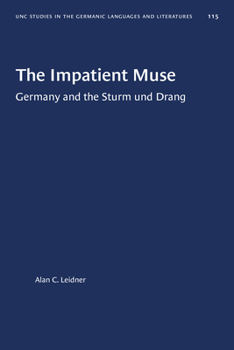Impatient Muse: Germany and the Sturm Und Drang
Far from being a forerunner of Weimar Classicism or an addendum to the Enlightenment, the Sturm und Drang is best seen as part of an autonomous culture of impatience -- as literature in which Germans, frustrated with their fragmented land, simulated a sense of power and effectiveness that political realities did not afford. This impatience drove not only authors and the characters they created; it also drew in German audiences and readers ready to...
Format:Hardcover
Language:English
ISBN:0807881155
ISBN13:9780807881156
Release Date:January 1994
Publisher:University of North Carolina Press
Length:168 Pages
Weight:0.94 lbs.
Dimensions:1.0" x 6.0" x 9.0"
Customer Reviews
0 rating





